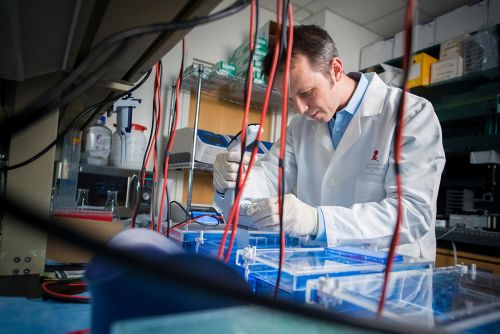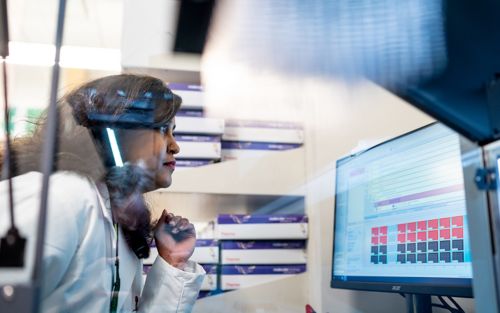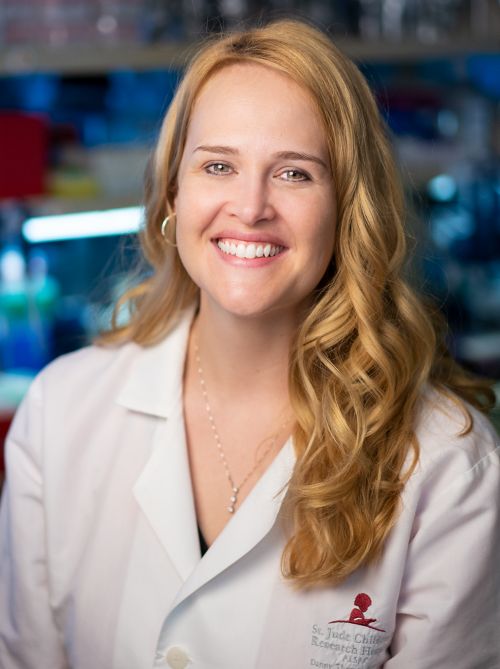St. Jude Family of Websites
Explore our cutting edge research, world-class patient care, career opportunities and more.
St. Jude Children's Research Hospital Home

- Fundraising
St. Jude Family of Websites
Explore our cutting edge research, world-class patient care, career opportunities and more.
St. Jude Children's Research Hospital Home

- Fundraising
The Center for Advanced Genome Engineering (CAGE) provides expertise and infrastructure for St. Jude investigators to educate, assist, expedite and perform established and emerging genome engineering technologies, including the CRISPR-Cas9 technology. The CAGE has 4 main objectives:
- Introduce user-defined missense mutations, knock-out and knock-in mutations in human, mouse and rat cell lines as well as human pluripotent stem cells.
- Design and generate the materials and validated genotyping protocols to streamline the rapid production of knockout and knock-in preclinical animal models in collaboration with the existing St. Jude GEMM Shared Resource.
- Identify, validate and introduce newly emerging genome editing technologies and applications to the St. Jude community.
- Facilitate pooled CRISPR screens by offering preassembled and custom sgRNA pooled libraries as well as preliminary downstream next generation sequencing and analysis.
OVERVIEW
The CAGE is a world-class genome-editing facility with the mission to provide low-cost, expeditious and collaborative genome-engineering services to St. Jude investigators. The CAGE boasts the expertise and infrastructure to educate, assist, expedite and perform established and emerging technologies.

IMPACT
The genome-engineering field is rapidly evolving. Accordingly, the CAGE spends time identifying, testing and evaluating the latest genome-editing tools, technologies and applications. The CAGE has worked with over 85 St. Jude investigators across 24 departments. Since the CAGE’s inception in 2017, CAGE scientists have enabled, collaborated on or published over 115 research papers in high-quality journals, including Cell, Nature, Nature Communications, Nature Genetics and Nature Neuroscience.

Services
- Design and validate genome-editing reagents, including gRNAs and donor templates
- Introduce user-defined knockout and knock-in mutations in human, mouse and rat cell lines as well as human pluripotent stem cells
- The CAGE can provide custom clonal cell lines or highly edited cell pools.
- Provide targeted next-generation sequencing (NGS) services for genome-editing outcomes
- Design and generate the materials and validated genotyping protocols to streamline the rapid production of knockout and knock-in preclinical animal models in collaboration with the existing St. Jude GEMM Shared Resource
- Facilitate pooled gRNA screening by offering preassembled and custom sgRNA pooled libraries as well as assisting in downstream next-generation sequencing and analysis after a screen has been completed
- Identify, validate and introduce newly emerging genome-editing technologies and applications to the St. Jude community
- Recently launched a new Cell Fitness (CelFi) assay, which allows investigators to rapidly follow up on pooled knockout screens and assess if a given perturbation causes a cellular fitness defect
Technology and advanced equipment
- (4) EVOS Tecan automated liquid handler robots
- MiSeq next-generation DNA sequencer
- (3) semi-automated benchtop pipettors
- (3) Multidrop Combi dispensers
- (2) Lonza 4D-Nucleofactor ® X Units
- Lonza Nucleofector shuttle
- Bio-Rad QX200 Droplet Digital PCR system
- EL406 plate washer dispenser
- BioTek Biostack 4 microplate stacker
CAGE By the numbers
200
200 custom-modified mouse models generated (including knockouts, conditional knockouts, large insertions, point mutations and deletions)
CAGE By the numbers
> 300
Over 300 highly edited cell pools
CAGE By the numbers
> 175
Over 175 Cell Fitness (CelFi) assays
CAGE by the numbers
1,000
custom modified cell lines
CAGE by the numbers
> 130
Assisted over 130 pooled CRISPR screens
CAGE by the numbers
> 5,000
Processes over five thousand samples per week for targeted NGS for CRISPR-editing outcomes
CAGE by the numbers
∞
Countless designed and validated gRNAs and donor templates
Dr. Shondra Pruett-Miller
Dr. Shondra Pruett-Miller is the director of the Center for Advanced Genome Engineering (CAGE) at St. Jude. She earned her PhD in Cell and Molecular Biology from UT Southwestern Medical Center and was the founder and director of the Genome Engineering and iPSC Center (GEiC) at Washington University in St. Louis before founding the CAGE shared resource at St. Jude in 2017. Her interests in genome-editing technologies, disease modeling in iPSCs and development of preclinical models using CRISPR-Cas9 help shape the extensive resources the CAGE provides investigators at St. Jude.
